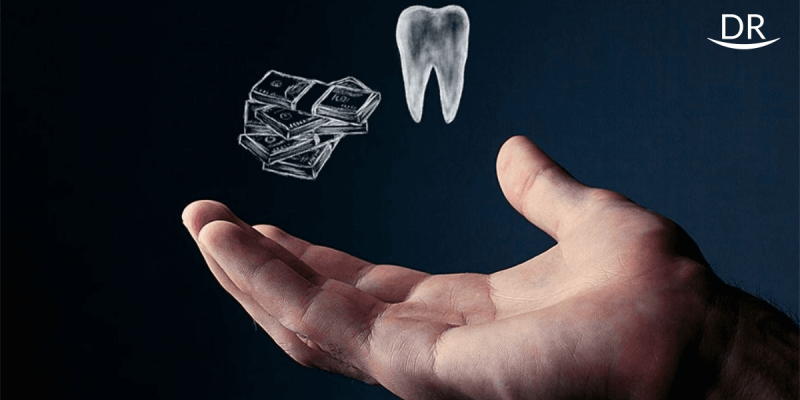Abstract
The most prudent challenge in post COVID dentistry is the increase in cost of oral health services which can limit patient access to health care. Post COVID dentistry (in a full fledged manner) is never going to be the same as pre COVID dentistry. Dentistry is going to be one of the costliest professions in India after applying all the latest norms and practice guidelines upon the resumption of the regular operations of dentistry. Thus, it is actually the time to analyze “the rising costs in the oral health care services and plan on how to reboot and restart the dental clinics” when the barriers are lifted fully to run the same with full aplomb.
Introduction
COVID-19 is having an unprecedented impact on the global economy, including the dental industry. Many dental clinics were kept shut for long and even today are running low key with a risk of their area turning into a containment zone anytime. The power of compounding vis-à-vis COVID-19 has finally set in and it is now the time to play further safe and be ready for the scenario mathematically when we resume practice fully.
Review
Let us begin by talking of the problems of COVID-19 along with the challenges of COSTING associated with it in the aftermath phase. In the post COVID-19 era, improving personnel safety in healthcare environments through appropriate use of Personal Protective Equipment (PPE) like body cover-alls, gloves, gowns, goggles and face masks would be paramount for every dentist and complete staff for dentists. Add to this, the various other inventory buys like negative ion generator, fogging machines, HEPA filters, fumigation machines, hi-vacuum suctions, extra-oral suctions, UV lighting systems etc. which too are going to add up to the initial investment post the COVID-19 mayhem. Don’t forget the regular replenishment for the cost of disinfectants, quaternary ammonium compounds, sodium hypochlorite and absolute alcohol / isopropyl alcohol based chemicals etc. Meeting all such expenses would indirectly mean an intensified care factor for the patient by adopting enhanced patient safety measures.
Even small clinics would be requiring bare minimum two assistants, one inside the operatory and another in the reception / waiting area. Assuming one of them is on leave some day, the role reversal trait for each of them will have to be taught via staff training. Dentistry is going to change and our patients will become more demanding in terms of sterilisation. So, we have to quit whining about our overhead and do something about it smartly by creating a plan and making bold decisions, some of them via a tough call.
Let me give you a case scenario of a patient coming in for a restoration (filling) for which you earlier charged, say Rs. 1000 . Just add up the bare minimum cost of 2 PPE’s of you and your assistant to the procedure along with the cost of disinfection and other standardized protocols.
Won’t the landing cost of one simple restoration zoom up to around Rs. 3000?
Would it be feasible and practical?
Let us just assume, these added costs in addition to an already expensive dentistry sojourn. Calculation and management of the expenses relating to clinic overheads, especially when done on a monthly basis is one of the most important tools for success in any dental practice. The most common reason that dentists don’t do this is that they are simply too busy to invest time in this, in light of the myriad of tasks and duties that must be completed in a given day.
Genuinely speaking, the first step is to examine each category of expense and to compare how it sits when seen against the ideal. Once we learn to apply some business principles to our decisions on fees, profitability, overhead and most useful of all, the return on investment done in clinic, believe me, life can be as rosy as you can expect. We have to take into account that our running costs are going to grow manifold and the incoming cash collection won’t be at the same pace and volume as before due to the decreased purchase power of the patients in this recessed economy. Every decision of investment in clinic; be it, buying new equipment or material has to now be backed by scientific logic, basic understanding of your clinic’s figures and numbers, and calculation of costs. If we don’t do this, all the above has a potential for the costs to be snowballed into an enhanced effect.
We surely will need to go back to our basics of knowing our figures and numbers, and that would also mean eliminating unwanted expenses when the more prudent ones start taking precedence. As effective working hours will be less, the planning would have to imperatively rotate around the aspect of treating less, but charging more vis-à-vis the aspect that the input expenses are now all set to go higher.
Let me first deal a bit on increased charges.
Revenue/Charging
I think that the Pareto’s principle of 80–20 is all set to play a bigger role in our dental clinics also, as it does in most spheres of business and life. The understanding of the charging part begins from the breakdown of our income from our record-keeping setup.
We have to first analyze which services are the most predominant ones contributing to our revenue, primarily in clinic (80%)?
One can be a Periodontist but his/her clinic earning may mostly be from crowns and bridges. The start, thus, has to be from the minute aspects. So, have a breakdown first to arrive at those services which contribute to the 80% income category (believe me, those will be just a handful) and those falling in the 20% income contribution (they would surely be a lot in number) category. Let us assume that you have arrived at a conclusion that your overall costs are going to increase by 25%.
So, how do you decide the raise in charges? Will you raise the charges of all services in the clinic?
My answer would be – No.
We don’t have to raise the charges of all our services but just those handful services contributing to our 80% revenue.
A simple formula would be to increase 25%–30% in the 80% contribution category services and 10%–15% in the services of 20% category, so that your average profit increase still comes up to almost 25%. Raising charges for every service by 25%–30% sends across a wrong message to your target group.
If we don’t increase our charges, we will continue to carry home less. I will demonstrate the same via a few scenarios below –
- If we assume that we earn the same income, our carry home income will drop down by 25% because of the rise in costs.
- For a 25% fall in income, our carry home will reduce by 44%.
- For a 33% fall in income, our carry home will reduce by 50%.
- For every 50% fall in income, our carry home will reduce by 63% (Alarming).
SOLUTION – The Coveted Formula – for Mr. India(n) Dentists!
You have to plan to increase treatment charges via Pareto principle phenomenon:
- 80% of paying services (although handful in number) escalated by 25%–30% (average 27.5%) – the average raise contributing to output is 22%.
- 20% of services (a bigger lot in number) escalated by 10–15% (average 12.5%) – the average raise contributing to output is 2.5%.
So, adding up the above 22% + 2.5% = 24.5%, or close to 25% increase in revenue.
Now assume the same scenarios as above after selective increase of charges along with increased costs as well due to COVID-19 :
- If we assume that we earn the same income, our carry home amount will rise by 25%.
- For a 25% fall in income, our carry home amount will reduce by just 6%.
- For a 33% fall, it will reduce by just 16% and
- For a 50% fall in income, the same will reduce by 38% (Manageable).
Convincing Patients
The above calculation conveys a message that hiking all types of pricing in general for all the services of a dental clinic is not going to serve much purpose, especially those services which we are not doing much in our practice anyways. Thankfully, we don’t have to explain the same as most people are learned in that sense of education vis-à-vis the awareness on TV news channels and internet currently regarding enhanced safety protocols. ‘Seeing is believing’ these days and when they see the same in your clinic, they will pay accordingly keeping their safety paramount and also spread their good view about you. Since you are not raising charges for every service, it is not sending across a wrong message to your loyal patient base.
The Catch
The first catch here is that I have taken expenses as 50% average whereas in reality, it might be 30%–40% or 60%–70% (less or more). Secondly, I have kept the average carry home income fixed at Rs. 50,000 and made the calculations of increase or decrease assumptions accordingly. Thirdly, with every percentage fall in revenue, I have proportionately reduced the expenses/overheads in accordance with decrease in income whereas in actuality, some fixed expenses may still be there which are fixed and not reduced and only the variable expenses are reduced. My basic idea was to put across the simple calculation that identifies with the hoi-polloi of dentists. If I opt for the real time calculations for a standardized clinic, the actual figures will be skewed a lot more and the carry home will decrease more. The main aim is just to give all a road map for calculation for increasing charges.
Most importantly, the baseline of the above system of raise was record-keeping and further segregation as to where does the 80% income come from, which is not followed meticulously in most of the small to middle level clinics in India, although it is mandated to be diligently resorted to as per the Dental Council of India regulations, Revised Guidelines 2014.
Summary
There is not even an iota of doubt that economy will be impacted a great deal. People won’t be spending money like they have in the past and will be more cautious and conservative. The financial environment may increase savings (as the perennial shift occurs from a want based to a need based in every significant aspect of life) which might be good for individuals but bad for the economy overall. The pertinent point here is that along with splurging on making investments in clinic, we devise ways to economically reduce our input (costs) so that we have a better carry home output (income).
Conclusion
As long as people have teeth and gums, there will be dental problems on this earth; the priorities might change for people (patients) like ‘this summer vacation I am going to Europe’ might change to ‘I am going to my dentist’. It is time for clinics to reset and reboot 2.0. It will require a stronger commitment by the dentists themselves to understand economics and a slight tweak by the DCI in their revised guidelines of 2014 vis-à-vis marketing.
Unless the above is done, dentistry won’t get its legitimate due in coming times.
To read more about practice & financial management in a pandemic, click here.
To read more about how to get back to work and practice post-COVID dentistry, click here.
References
- https://www.amboss.com/us/knowledge/Principles_of_medical_law_and_ethics
- https://www.bookkeepingfordentists.com/post/how-to-calculate-dental-office-overhead
- https://blatchford.com/resources/dental-practice-management-articles/three-ways-to-better-manage-overhead/
- https://www.cda.org/Home/News-and-Events/Newsroom/Article-Details/return-to-practice-roadmap-for-dentists-in-post-covid-19-pandemic
- http://www.contempclindent.org/article.asp?issn=0976-237X;year=2018;volume=9;issue=1;spage=97;epage=104;aulast=Kemparaj
- https://www.dentalcare.com/en-us/practice-management/collections/how-to-run-a-dental-office-and-control-spend
- https://www.dentaleconomics.com/money/article/16388539/getting-on-the-fast-track
- https://www.dentaleconomics.com/practice/overhead-and-profitability/article/16393116/you-choose-your-overhead
- https://www.dentaleconomics.com/practice/article/16389638/gross-profit-margin-an-underutilized-tool-in-managing-profitability
- https://www.dentistryiq.com/practice-management/financial/article/14040333/understanding-profit-in-the-dental-practice
- https://www.dentistryiq.com/practice-management/financial/article/16365707/des-business-lab-video-part-2-how-to-calculate-dental-practice-overhead
- https://www.dentistrytoday.com/news/todays-dental-news/item/3292-understanding-overhead-in-the-dental-practice
- https://docs.google.com/forms/d/e/1FAIpQLScYOsy6RSjzWsGTQ-34zO1wEpE2cgZkU3s8H4WDNq6PlQubMQ/viewanalytics
- https://www.healthsystemtracker.org/brief/how-health-costs-might-change-with-covid-19/
- http://www.jeed.in/article.asp?issn=0974-7761;year=2012;volume=2;issue=2;spage=65;epage=68;aulast=Sridharan
- http://www.jofs.in/article.asp?issn=0975-8844;year=2016;volume=8;issue=2;spage=128;epage=134;aulast=Kesavan
- https://www.nature.com/articles/s41415-020-1482-1
- https://www.ncbi.nlm.nih.gov/pmc/articles/PMC5863419/
- https://www.ncbi.nlm.nih.gov/pubmed/29599593
- https://nexacollect.com/debt-recovery/dental-office-overhead/
- http://oxfordmedicine.com/view/10.1093/med/9780199600830.001.0001/med-9780199600830-part-1700
- https://www.sochealth.co.uk/national-health-service/public-health-and-wellbeing/poverty-and-inequality/the-inverse-care-law/




















Comments